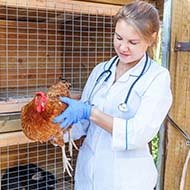New student grant for chicken veterinary health research

Applications are welcomed from undergraduate veterinary students and vet nurses.
BSAVA PetSavers has partnered with the British Hen Welfare Trust (BHWT) to fund a grant for an undergraduate student research project in chicken veterinary health.
The grant will be £2,500, and applications for the grant opened 1 September 2021, closing on 15 December 2021.
BHWT founder Jane Howorth MBE commented on the need for the grant: “We are extremely excited to be embarking on this partnership with such a prestigious organisation as BSAVA PetSavers to lead the way in encouraging pioneering research into chickens.
“Hens are becoming increasingly popular as pets but sadly hen keepers often find there is a lack of treatment options specifically for chickens.
“That’s why we set up our dedicated Hen Helpline for people, but we know that enhancing veterinary research and knowledge into chickens is vital to support the growing number of backyard hen keepers. Jointly offering a grant with BSAVA PetSavers is a big step forward to providing that support.”
Owing to the growing demand for specialist knowledge and treatment of chickens, the two organisations hope that the grant will help to improve veterinary understanding chicken health, and improve the welfare of pet hens.
David Killick, from BSAVA PetSavers added: “BSAVA PetSavers is delighted to collaborate with the BHWT in supporting a summer research project for a student interested in learning more about the needs of pet chickens and how to meet them.
“The funding will support research and stipend costs and provide the student with the prestigious opportunity to present their work at BSAVA Congress; we look forward to seeing the outcome of the project.”
Applications for the grant should be made by prospective supervisors of undergraduate vets or vet nurses from UK universities. More information on the grant, alongside how to apply, can be found here.



 The latest
The latest